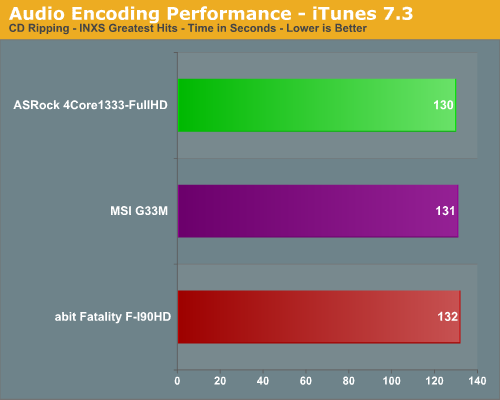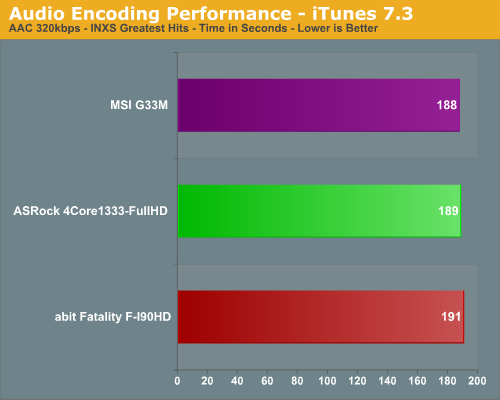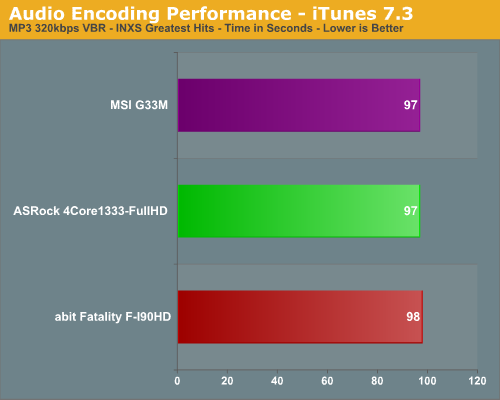µATX Part 1: ATI Radeon Xpress 1250 Performance Review
by Gary Key on August 28, 2007 7:00 AM EST- Posted in
- Motherboards
Audio Encoding Performance
We will utilize iTunes 7.3 for our audio encoding tests as it is one of the most utilized audio applications available due to the immense popularity of the iPod.
Our first task was to figure out what test CD to utilize. We needed one that contained a significant number of tracks and had over 600MB of data in order to properly stress our platforms. As in previous articles, we are using an INXS Greatest Hits CD for testing, which contains 16 tracks totaling 606MB of songs. Our first test consists of utilizing iTunes to rip our INXS CD in WAV format onto our hard drive. Even though CPU speed and optical drive selection have a great impact on these test results we are using the same optical drive between platforms for each test.

Our test platforms score within 1% of each other. This test was very consistent with each result never varying more than one second from the base score as the test heavily relies on the performance of the optical drive which results in margins that are minimal.
Our next two tests have us utilizing iTunes to convert our WAV files into ACC or MP3 compatible formats. We utilize the 320kbps and variable bit rate option for both tests.


We usually see iTunes favoring a system with excellent CPU throughput and these tests indicate the Radeon X1250 is up to speed in this area. The difference between the Intel equipped MSI G33M and the two X1250 boards is around 1% in both tests. While Intel based chipsets usually have an advantage over their competitors in CPU throughput, it is refreshing to see some competition in this area, even if this is the last Intel based chipset from AMD/ATI.
We will utilize iTunes 7.3 for our audio encoding tests as it is one of the most utilized audio applications available due to the immense popularity of the iPod.
Our first task was to figure out what test CD to utilize. We needed one that contained a significant number of tracks and had over 600MB of data in order to properly stress our platforms. As in previous articles, we are using an INXS Greatest Hits CD for testing, which contains 16 tracks totaling 606MB of songs. Our first test consists of utilizing iTunes to rip our INXS CD in WAV format onto our hard drive. Even though CPU speed and optical drive selection have a great impact on these test results we are using the same optical drive between platforms for each test.

Our test platforms score within 1% of each other. This test was very consistent with each result never varying more than one second from the base score as the test heavily relies on the performance of the optical drive which results in margins that are minimal.
Our next two tests have us utilizing iTunes to convert our WAV files into ACC or MP3 compatible formats. We utilize the 320kbps and variable bit rate option for both tests.


We usually see iTunes favoring a system with excellent CPU throughput and these tests indicate the Radeon X1250 is up to speed in this area. The difference between the Intel equipped MSI G33M and the two X1250 boards is around 1% in both tests. While Intel based chipsets usually have an advantage over their competitors in CPU throughput, it is refreshing to see some competition in this area, even if this is the last Intel based chipset from AMD/ATI.










22 Comments
View All Comments
Griswold - Wednesday, August 29, 2007 - link
There are a couple SM2.0 patch projects for bioshock out there. Google for it.mostlyprudent - Tuesday, August 28, 2007 - link
I am looking forward to the rest of the series.